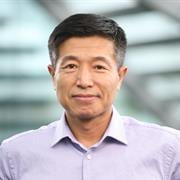Examples of incorporating generative AI into teaching
Our colleagues have shared their ideas on how we might leverage Gen-AI tools for coursework and assessment tasks.
If you have an example of your own to share, please get in touch.

Dr Thomas Loho
Faculty of Engineering and Design
CHEMMAT 121: Materials Science
Dr Thomas Loho, a professional teaching fellow in the Chemical and Materials Engineering department, discussed the innovative use of generative AI, specifically Chat GPT, in his teaching approach. He introduced the concept of leveraging AI to design creative assessments, particularly in the context of online evaluations. Instead of perceiving AI as a threat, Thomas proposed that it could be harnessed to craft engaging assignments and questions for students.
He shared a specific example from his 2023 summer school course, where he employed Chat GPT to create an exam question related to a copper-nickel alloy. This question appeared intelligently crafted at first glance, but students were expected to identify errors within it, such as inaccuracies in material properties. Students appreciated the challenge and viewed Chat GPT-generated questions as a tool to promote critical thinking rather than a direct source of information.
Thomas emphasised that students should use AI-generated content as a starting point for further research and fact-checking, similar to consulting a colleague or searching the internet. He highlighted the potential for generative AI to enhance student learning by encouraging independent verification of information.
Due to the positive feedback from students, Thomas has incorporated Chat GPT into his other courses as well. Thomas’s approach showcases the beneficial use of generative AI in education to inspire critical thinking and promote effective learning. Thomas welcomes inquiries and discussions about his innovative teaching methods.

Professor Alex Sims
Business School
Postgraduate Diploma in Bioscience Enterprise Program
SCIENT 704 is a course within the Postgraduate Diploma in Bioscience Enterprise program, primarily taken by students with backgrounds in science. These students pursue a diverse curriculum, encompassing subjects such as accounting, finance, marketing, law, and commercialisation, in addition to courses in Biological Sciences, Bioinformatics, Medical Science, Medicinal Chemistry, Food Science, Pharmacology, or Psychology.
In SCIENT 704, students delve into foundational legal concepts, intellectual property (IP), and IP strategy. This particular assignment spanned the initial five weeks of the course, covering topics like copyright law, contract law, statutory interpretation, and agency law. Moreover, it equipped students with practical skills, including using track changes and making comments on documents, offering advice, and providing information. The deliberate intent behind this assessment was to simulate real-world scenarios, as graduates from the program often find themselves engaged in contract management and IP commercialisation within organisations.
Professor Alex Sims designed an authentic assessment wherein students had to review a draft contract containing errors, using track changes to submit a revised version in a Word document. This task required students to possess the knowledge to spot and rectify the errors and also explain why there were errors. Importantly, this assessment holds practical relevance, mirroring the tasks they will encounter in their future workplaces. In the video presentation, Alex further elaborates on the rationale behind this approach, emphasising the use of a specific rubric.
View example of SCIENT 704 First Semester, 2023: Contract Analysis Assignment (PDF).
Please reach out to Alex (a.sims@auckland.ac.nz) if you have any questions about incorporating generative AI in coursework and assessments.

Dr Ruth Dimes & Prof Charl de Villiers
Business School
ACCTG 780: Sustainability Accounting and Integrated Reporting
In response to the launch of ChatGPT in November 2022, Ruth Dimes and Charl de Villiers redesigned the assessments to allow students to engage with generative AI and develop their critical evaluation skills in sustainability accounting and integrated reporting.
In this course students practise submitting prompts to Chat GPT then revising their prompts, to gradually achieve a satisfactory outcome in the form of a CEO report. The student generated reports are then combined with real reports and other AI generated ones, which are then critiqued and subject to peer review.
Each assessment has relevance to the finance and corporate industry and incorporating AI into the assessment prepares students for real world tasks that they will be expected to complete. It engages students critical evaluation and analysis skills. The assessments have a mixture of low and high stakes grading enabling students to receive feedback and build upon their learning as they progress through the course.

Associate Professor Ethan Cochrane
Business School
Postgraduate Diploma in Bioscience Enterprise Program
Ethan Cochrane has designed ANTHRO 306 using Bloom’s knowledge taxonomy. The first third of the course builds a basic foundation of the facts of Pacific archaeology. The second third is about comparisons with these data, and the final third focuses on evaluating knowledge claims.
The final assessment is an essay on best practice for evaluating competing knowledge claims using archaeological debates and literature discussed in class. For this essay students must also read and annotate assigned texts prior to class discussion. Their reading and engagement with the texts is automatically marked through the Perusall app within Canvas. Ethan’s “real world” goals for this essay, and other assessments, are plainly stated in the assessment briefs. For example, considering the final assessment, “You may not write many long-form essays outside of university, but in the professional world you will often have to aggregate different kinds of information – verbal, written, audio-visual – into a cohesive picture that supports a particular position. Ultimately, this is what you are learning to do here.”
Ethan last taught this course and used this assessment in 2020, before the proliferation of Gen-AI writing, and Perusall software for group-reading and automatic marking of student annotations. This year he has made a more specific requirement for the final essay to lessen dependence on Gen-AI: students must reference in-class discussions. He does not provide lecture recording of these discussions, requiring students to engage in face-to-face conversation, in real-time, and with the physicality and emotional appeals this can involve. He encourages students to consider that this too will benefit them in the world of work (and life in general).
Finally, Ethan uses ChatGPT in class to produce a final essay for this assessment to teach about the overly general responses made by Gen-AI text relative to the assigned readings and class discussions.

Dr Mohsen Mohammadzadeh
Faculty of Engineering and Design
Urban Planning Programme
As a student, engineer, and educator, Mohsen Mohammadzadeh noticed how tech changes transformed education, work, and daily life. He’s curious about both the good and bad effects of new technologies, like Gen-AI. This curiosity is important for his Urban Planning courses, where he teaches Policy-making, Smart Cities, and Planning Theory. Dr. Mohsen uses his academic and professional network to stay updated and improve his teaching and pedagogies using new technology advancements. He adjusted how he teaches to match and dedicates lectures to technology’s philosophy and ethics. Assessments have also been redesigned to:
- Using formative assessments instead of summative assessments.
- Diversifying assessments, including quizzes, class tasks, group work presentations and video recordings, and individual practice-based projects.
- Focusing on crucial skills such as problem solving, critical thinking, innovation, and creativity. Carefully write Learning Outcomes to align with the skills being assessed.
- Designing the assignments and assessments as a process, considering the steps of the project, rather than solely focusing on the final work submission.

Dr Elham Bahmanteymouri
Faculty of Engineering and Design
Urban Land Economics, Urban Economic Development and Urban Economics
Elham Bahmanteymouri, an economist, believes innovation and technology are vital amid economic crises. She adapts her teaching to technology advancements and stays updated on teaching methods, industry changes, and ethics. Her course strategies are:
- Prioritising ongoing improvement and continuous feedback through formative assessments.
- Diverse assessments such as quizzes, tasks, group and individual projects to allow students to engage with different aspects of the subject matter and develop diverse skills.
- Using discussions, presentations and teamwork for AI-integrated assessments to encourage critical thinking.
- Highlighting AI as a tool, not a replacement for deep thinking.
- Students share how AI influenced their assignments.
- Focusing on problem-solving, critical thinking, innovation, and creativity skills.
- Design assignments as step-by-step processes to create final work submission which nurture continuous learning.
- Using university technology tools for digital literacy and Gen-AI readiness.
- Encouraging ChatGPT use for research, with a reminder to verify information from reputable sources to ensure accuracy and reliability.

Belinda Zohrab-McConnell
Business School
COMLAW 301: Taxation
Belinda has designed an innovative assessment in her Taxation course for third-year students that simulates a real-world scenario where an AI output must be critically analysed for accuracy.
The assignment involves a fictitious client scenario, where students are required to review a draft ‘advice letter’ (assumed to be an AI output) for technical accuracy. Students are tasked with identifying which parts of the advice are correct or incorrect, or partially so, with reference to relevant theoretical principles. This approach encourages students to critically evaluate AI-generated content and reinforces the value of human expertise in the field of taxation.

Dr Benjamin Liu
Business School
COMLAW 305: Financial Markets Law
In his Stage 3 Financial Markets Law course, Benjamin has introduced a bespoke AI Virtual Teaching Assistant (VTA) programmed using Open AI. The VTA’s role is to answer students’ queries on the basics of financial law. Despite being programmed with specialist datasets, the VTA sometimes falls short, demonstrating to students that while AI can be useful, it also has limitations and may not always provide specialist tailored advice. This experience underscores the importance of viewing AI outputs with scepticism and encourages students to conduct their own investigations, either through further reading, class discussions, or by directly asking the lecturer.
Read Benjamin’s thoughts on the power and perils of AI in his post on the Business School’s website.

Anna Hales
Business School
MBA 750: Navigating the Business Environment
In the current dynamic landscape of legal and ethical considerations, Anna encourages the integration of AI with the unique perspectives of students in the MBA program. Assessments are designed to navigate novel situations impacting human rights and obligations, where the distinct human experience is paramount. For example, students were tasked with drafting submissions for the Education & Workforce Select Committee on proposed legal changes affecting restraint of trade clauses in employment contracts. With no prior AI data available, students’ personal insights were crucial. They reflected on the potential impact on their business sectors, drawing from their experiences and industry knowledge. This exercise not only highlighted the importance of human input in law-making but also empowered students to engage in future legislative processes.
Case studies in teaching
Teaching Tip: Use AI-generated videos for lab and equipment inductions
Blair Sowman boosted lab safety engagement by swapping lengthy documents for AI-generated videos with quizzes.
Teaching Tip: Use Gen-AI to deepen learning and spark creativity
Dr Courtney Ruha (School of Chemical Sciences) helps students connect chemistry to real life through creative, collaborative group projects using generative AI.
Insights: Designing with AI – reimagining architectural education
Can Gen-AI tools enhance architectural students' design process and critical thinking skills? Read on to find out.
The future is now: Embracing AI in digital marketing education
In their tech-infused courses, Patrick Dodd, Inna Piven, and Dr Shahper Richter, are shaping a digital marketing curriculum that aims to prepare students for an AI-centric future.
See also
Gen-AI in teaching and learning: A UoA webinar
The Academic Integrity CoP hosted a panel discussion on 12 June 2023. Topics discussed included: assessment design to mitigate/incorporate Gen-AI, tools to detect its use, the student perspective, and where to from here.
Read the questions (PDF) that were asked during the webinar.
Page updated 30/05/2025 (stylistic changes)




